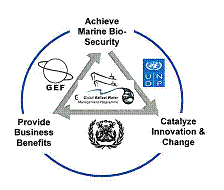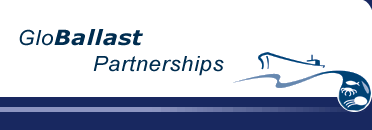|
Following the success of the GloBallast Programme, IMO
has again joined forces with the Global Environment Facility (GEF), the United
Nations Development Programme (UNDP), member governments and the shipping
industry to assist less-industrialised countries to tackle the ballast
water problem.
The full title of this project is Building Partnerships to Assist Developing Countries to Reduce the Transfer of Harmful Aquatic Organisms in Ships’ Ballast Water. It is more simply referred to as GloBallast Partnerships.
The overall goal of the GloBallast Partnerships Project (GBP) is to reduce the risks and impacts of marine bio-invasions caused by international shipping.
The specific objective of GBP is to assist vulnerable developing states and regions to implement sustainable, risk-based mechanisms for the management and control of ships’ ballast water and sediments in order to minimize the adverse impacts of aquatic invasive species transferred by ships.
GBP will assist developing countries to reduce the risk of aquatic bio-invasions mediated by ships’ ballast water and sediments and will expand and build on the successfully completed GEF-UNDP-IMO pilot project. With the help of tools developed and lessons learned from the pilot project, GBP will expand government and port management capacities, instigate legal, policy and institutional reforms at the country level, develop mechanisms for sustainability, and drive regional coordination and cooperation.
The project will spur global efforts to design and test technology solutions, and will enhance global knowledge management and marine electronic communications to address the issue. The partnership effort is three-tiered, involving global, regional and country-specific partners, representing government, industry and non-governmental organizations. Private sector participation will be achieved through establishing a GloBallast Industry Alliance with partners from major maritime companies.
13 countries, from 6 high priority regions, have agreed to take a lead partnering role focusing especially on legal, policy and institutional reform. All told, more than 70 countries in 14 regions across the globe will participate, including the six pilot countries whose expertise and capacities will be drawn on for this global scaling-up effort.


 Regional Contacts
Regional Contacts
GloBallast Partnerships will assist developing countries to reduce the risk of aquatic bio-invasions mediated by ships’ ballast water and sediments and will expand and build on a successfully completed GEF-UNDP-IMO pilot project (GloBallast Project). With the help of tools developed and lessons learned from the pilot project, the GloBallast Partnerships project will expand government and port management capacities, instigate legal, policy and institutional reforms at the country level, develop mechanisms for sustainability, and drive regional coordination and cooperation.
The project will spur global efforts to design and test technology solutions, and will enhance global knowledge management and marine electronic communications to address the issue. The partnership effort is three-tiered, involving global, regional and country-specific partners, representing government, industry and non-governmental organizations. Private sector participation will be achieved through establishing a GloBallast Industry Alliance with partners from major maritime companies.
GBP Development Objectives
The broad development objectives of the Project are to assist developing countries to:
Project Outcomes
GloBallast Partnerships has four key expected outcomes:
- Learning, evaluation and adaptive management increased.
- BWM Strategies in place, with legal, policy and institutional reforms developed, implemented and sustained at national level.
- Knowledge management tools and marine monitoring systems are effectively utilized to expand global public awareness and stakeholder support, improve understanding of ballast water impacts on marine ecology, and enhance maritime sector communications.
- Public-private partnerships developed to spur the development of cost-effective ballast water technology solutions. For more information, click here.
The project implementation strategy for GBP uses a multi-component, multi-tired approach:
- A global component, managed through IMO London, providing international coordination and information dissemination, including the development of toolkits and guidelines, and establishing a strong cooperation with industry and NGOs.
- A regional component, providing regional coordination and harmonization, information sharing, training, and capacity building in the application of ballast water management tools and guidelines. The regional component and activities will be coordinated with the support of Regional Coordinating Organizations(RCOs).
- A significant country component, that establishes a fast track (Lead Partner Country-LPC) and partner track (Partner Country-PC) process for GEF-eligible countries in the priority regions. LPCs are the countries who have committed to develop and implement a National Ballast Water Management Strategy (NBWMS), and to adopt legal, policy and institutional Reforms (LPIR). In addition, LPCs will host the Regional capacity building activities such as regional training and the regional strategy development meetings. The Partners Countries would benefit from the Regional Capacity building activities and will participate in the regional strategy development.
Timeline
This is a five-year project, from October 2007 to October 2012.
Project Management
The Project is being implemented by UNDP and executed by IMO, under the GEF International Waters portfolio.
A three person Project Coordination Unit (PCU) has been established within the Marine Environment Division (MED) at IMO headquarters in London.
The PCU has the benefit of the support, facilities and services of IMO. High priority is being given to coordinating the activities of the programme with the broader activities of IMO, especially the adoption of the IMO Ballast Water Management Convention and the IMO Integrated Technical Cooperation Programme
National Focal Points (NFPs) and National Project Coordinators (NPC) have been established in each of the Lead Partnering Countries, supported by inter-ministerial/cross-sectoral National Task Forces (NTFs). A list of NFPs and NPCs can be found here .
Overall, the Project is advised by a Global Project Task Force (GPTF). This comprises representatives of GEF, UNDP, IMO, the participating countries, the shipping industry, international environmental NGOs and possible other parties that are able to contribute to the programme in a meaningful way.
A similar structure operates at the regional and national levels, with National Focal Points and other relevant parties participating in Regional Task Force (RTF) meetings, and similarly at National Task Force (NTF) meetings. Members of the NTF will report to the RTF, and in turn RTF members will report to the GPTF. With this mechanism in place, information is disseminated and activities coordinated between all parties, at all levels. This allows experiences to be shared and learned from globally, helping to achieve the Project's main objectives.
Global Industry Alliance for Marine Biosecurity (GIA)
 It is abundantly clear that global environmental problems like marine bioinvasions will be solved only if the private sector also weighs in with its vast technical, managerial and financial resources and expertise. The private sector is therefore recognized as an important stakeholder in all GBP activities and has been playing a critical role in addressing ballast water challenges, in partnership with the GBP. It is abundantly clear that global environmental problems like marine bioinvasions will be solved only if the private sector also weighs in with its vast technical, managerial and financial resources and expertise. The private sector is therefore recognized as an important stakeholder in all GBP activities and has been playing a critical role in addressing ballast water challenges, in partnership with the GBP.
This innovative public-private sector partnership model is the first of its kind, and will assist in creating solutions for addressing the ballast water issues, including innovative technologies, along-with training and capacity-building activities. GBP’s private sector alliances such as the GIA and the expected outcomes from such alliances will clearly send an optimistic message to the global community that, while the environmental challenges appear to be significant, they are not insurmountable - with the effective and intelligent use of resources and through an integrated and collaborative approach, answers to these challenges will be found, so that shipping industry can continue to work in harmony with the environment.
For more detailed information about the GBP Global Industry Alliance and the current GIA partners, please click here.
Project Summary
Development objectives |
|
Timeline |
- Five years – October 2007 – October 2012
|
Funding |
- Global Environmental Facility (GEF) Grant, Co-Financing by IMO, GBP Participating Countries and Private Sector,
|
Implementation |
|
Execution |
|
Recipients/
beneficiaries |
|
Partners |
- Shipping and port industries, national administrations, international environmental non-governmental organizations, other parties as programme develops.
|
Activities to be undertaken |
- Establish PCU at IMO, comprising Chief Technical Adviser, Technical Adviser, Administrative Assistant and support.
- Develop Info/Comms Network - including web-site, databases/directories, library collections, newsletter and an information clearing house.
- Identify Lead Agency, National Focal Point (NFP), National Project Coordnator (NPC) and establish National Project Task Force (NPTF) in each Lead Partner Country.
- Establish global coordination arrangements - Global Project Task Force.
- Form Regional Task Force (RTFs) to support development and adoption of a regional approach to ballast water management
- Develop and implement communication, education , awareness raising and outreach programmes.
- Develop knowledge management and globallast electronic information exchange systems including country profile database and information clearing-house mechanisms
- Develop introductory and more specialized training packages to train Lead Agency, port and shipping personnel in ballast water management measures as contained in IMO Convention and associated guidelines.
- Develop model legislations and compliance monitoring and enforcement models and related training modules to build capacity among the LPCs to address the issue
- Undertake rapid review of the baseline situation and an economic assessment in all LPCsto assist the development of a National Ballast Water Management Strategy (NBWMS)
- Review legislation relevant to ballast water in each country and advise/assist improvements.
- Implement national ballast water management strategy in each Lead Partnering Country including implementation of compliance monitoring and enforcement strategies.
- Develop regional capacity to undertake Port Baseline Surveys (PBS) of native biota and introduced marine species through regional PBS training programmes.
- Hold global R&D symposiums to review scope for new ballast water management and treatment measures and coordinate R&D agenda.
- Establish Global Industry Alliance for Marine Biosecurity (GIA) and GIA Fund to support activities aimed at technology development and technology diffusion among the industry
|
Regional Activities
National Activities
Progress Reports
|




